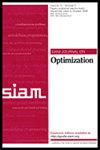Reducing Nonnegativity over General Semialgebraic Sets to Nonnegativity over Simple Sets
IF 2.3
1区 数学
Q1 MATHEMATICS, APPLIED
引用次数: 0
Abstract
SIAM Journal on Optimization, Volume 34, Issue 2, Page 1970-2006, June 2024.Abstract. A nonnegativity certificate (NNC) is a way to write a polynomial so that its nonnegativity on a semialgebraic set becomes evident. Positivstellensätze (Psätze) guarantee the existence of NNCs. Both NNCs and Psätze underlie powerful algorithmic techniques for optimization. This paper proposes a universal approach to derive new Psätze for general semialgebraic sets from ones developed for simpler sets, such as a box, a simplex, or the nonnegative orthant. We provide several results illustrating the approach. First, by considering Handelman’s Positivstellensatz (Psatz) over a box, we construct non-SOS Schmüdgen-type Psätze over any compact semialgebraic set, that is, a family of Psätze that follow the structure of the fundamental Schmüdgen’s Psatz but where instead of SOS polynomials, any class of polynomials containing the nonnegative constants can be used, such as SONC, DSOS/SDSOS, hyperbolic, or sums of AM/GM polynomials. Second, by considering the simplex as the simple set, we derive a sparse Psatz over general compact sets which does not rely on any structural assumptions of the set. Finally, by considering Pólya’s Psatz over the nonnegative orthant, we derive a new non-SOS Psatz over unbounded sets which satisfy some generic conditions. All these results contribute to the literature regarding the use of non-SOS polynomials and sparse NNCs to derive Psätze over compact and unbounded sets. Throughout the article, we illustrate our results with relevant examples and numerical experiments.
将广义半代数集合上的非负性简化为简单集合上的非负性
SIAM 优化期刊》,第 34 卷第 2 期,第 1970-2006 页,2024 年 6 月。 摘要。非负性证明(NNC)是多项式的一种写法,它使多项式在半代数集合上的非负性变得明显。Positivstellensätze (Psätze) 保证 NNCs 的存在。NNCs和Psätze都是强大的优化算法技术的基础。本文提出了一种通用方法,即从针对较简单集合(如盒形集合、单纯形集合或非负正交集合)开发的新Psätze推导出针对一般半代数集合的新Psätze。我们提供了几个结果来说明这种方法。首先,通过考虑方格上的汉德尔曼正定定理(Psatz),我们构建了任何紧凑半代数集合上的非 SOS 施密特型定理,即遵循基本施密特定理结构的定理族,但其中可以使用任何包含非负常数的多项式类代替 SOS 多项式,如 SONC、DSOS/SDSOS、双曲线或 AM/GM 多项式之和。其次,通过将单纯形视为单纯集,我们推导出了一般单纯集上的稀疏 Psatz,它不依赖于单纯集的任何结构假设。最后,通过考虑非负正交上的 Pólya Psatz,我们推导出了无界集合上的一种新的非 SOS Psatz,它满足一些通用条件。所有这些结果都为有关使用非 SOS 多项式和稀疏 NNC 来推导紧凑集和无约束集上的 Psätze 的文献做出了贡献。在整篇文章中,我们用相关的例子和数值实验来说明我们的结果。
本文章由计算机程序翻译,如有差异,请以英文原文为准。
求助全文
约1分钟内获得全文
求助全文
来源期刊

SIAM Journal on Optimization
数学-应用数学
CiteScore
5.30
自引率
9.70%
发文量
101
审稿时长
6-12 weeks
期刊介绍:
The SIAM Journal on Optimization contains research articles on the theory and practice of optimization. The areas addressed include linear and quadratic programming, convex programming, nonlinear programming, complementarity problems, stochastic optimization, combinatorial optimization, integer programming, and convex, nonsmooth and variational analysis. Contributions may emphasize optimization theory, algorithms, software, computational practice, applications, or the links between these subjects.
 求助内容:
求助内容: 应助结果提醒方式:
应助结果提醒方式:


